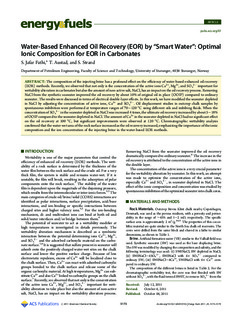| dc.contributor.author | Fathi, Seyed Jafar | |
| dc.contributor.author | Austad, Tor | |
| dc.contributor.author | Strand, Skule | |
| dc.date.accessioned | 2013-07-23T12:34:22Z | |
| dc.date.available | 2013-07-23T12:34:22Z | |
| dc.date.issued | 2011 | |
| dc.identifier.citation | Fathi, S J., Austad, T., Strand S. (2011) Water-based enhanced oil recovery (EOR) by “Smart Water”: optimal ionic composition for EOR in carbonates. Energy & Fuels 25(11), pp. 5173–5179 | no_NO |
| dc.identifier.uri | http://hdl.handle.net/11250/183214 | |
| dc.description | Reprinted (adapted) with permission from Fathi, S J., Austad, T., Strand S. (2011) Water-Based Enhanced Oil Recovery (EOR) by “Smart Water”: Optimal Ionic Composition for EOR in Carbonates. Energy & Fuels 25(11), pp. 5173–5179. Copyright (2011) American Chemical Society. The article forms part of the Jafar Fathi's PhD thesis : Fathi, J. (2011) Water-Based Enhanced Oil Recovery (EOR) by "Smart Water" in Carbonate Reservoirs. University of Stavanger. | no_NO |
| dc.description.abstract | The composition of the injecting brine has a profound effect on the efficiency of water-based enhanced oil recovery
(EOR) methods. Recently, we observed that not only is the concentration of the active ions Ca2+, Mg2+, and SO4
2 important for
wettability alteration in carbonates but also the amount of non-active salt, NaCl, has an impact on the oil recovery process. Removing
NaCl from the synthetic seawater improved the oil recovery by about 10% of original oil in place (OOIP) compared to ordinary
seawater. The results were discussed in terms of electrical double-layer effects. In this work, we have modified the seawater depleted
in NaCl by adjusting the concentration of active ions, Ca2+ and SO4
2 . Oil displacement studies in outcrop chalk samples by
spontaneous imbibition were performed at temperature ranges of 70 120 C using different oils and imbibing fluids. When the
concentration of SO4
2 in the seawater depleted in NaCl was increased 4 times, the ultimate oil recovery increased by about 5 18%
ofOOIP compared to the seawater depleted in NaCl. The amount of Ca2+ in the seawater depleted in NaCl had no significant effect
on the oil recovery at 100 C, but significant improvements were observed at 120 C. Chromatographic wettability analysis
confirmed that the water-wet area of the rock surface increased as the oil recovery increased, emphasizing the importance of the ionic
composition and the ion concentration of the injecting brine in the water-based EOR methods. | no_NO |
| dc.language.iso | eng | no_NO |
| dc.publisher | American Chemical Society | no_NO |
| dc.subject | EOR | no_NO |
| dc.subject | wettability | no_NO |
| dc.subject | enhanced oil recovery | no_NO |
| dc.subject | smart water | no_NO |
| dc.title | Water-based enhanced oil recovery (EOR) by “Smart Water”: optimal ionic composition for EOR in carbonates | no_NO |
| dc.type | Journal article | no_NO |
| dc.type | Peer reviewed | no_NO |
| dc.type | Doctoral thesis | |
| dc.subject.nsi | VDP::Technology: 500::Rock and petroleum disciplines: 510::Petroleum engineering: 512 | no_NO |
| dc.source.pagenumber | 5173–5179 | no_NO |
| dc.source.volume | 25 | no_NO |
| dc.source.journal | Energy & Fuels | no_NO |
| dc.source.issue | 11 | no_NO |
| dc.identifier.doi | 10.1021/ef201019k | |
